
|
Philippines, 08 Jan 2026 |
Home >> News |
 |
||||
|
|
|
|
Harry Stone: The Enduring Influence of an American-Australian Boxer on Filipino Boxing Legacy By Emmanuel Rivera, RRT PhilBoxing.com Sat, 30 Dec 2023 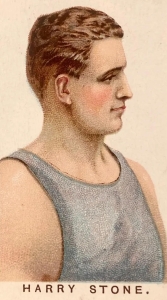 For over two decades, spanning the 1910s and 1920s, fighters of renown from America, Britain, and Australia were attracted to the Philippines before retiring from boxing. The arrival of internationally acclaimed boxers in Manila significantly contributed to establishing the Filipino presence in the sport. The coming of Llew Edwards, an Englishman, profoundly inspired the late Francisco Guilledo, famously recognized as Pancho Villa, the dynamo from the Philippines. This inspiration fueled Villa’s pursuit of the world flyweight championship, a title he proudly held until his premature passing. Another notable foreign contender was Harry Stone, an American native of New York who eventually settled in Australia. He stepped into the Olympic Stadium on Avenida Rizal with a determined purpose—to engage in legacy-defining bouts, starting with those against Ceferino Garcia and Irineo Flores. Reflecting on their encounter, Stone recalled, 'When I first met Garcia, he was young, but his punching power was like an unstoppable force.' 'Hop’ Harry's fistic adventures in the Philippine islands had a transformative impact on Garcia and Flores, shaping their reputations that continue to influence Filipino boxers today. Garcia's two closely contested bouts against Barney Ross highlighted his skill and ability in the ring. The bolo punch, which gained fame through Garcia, originally stemmed from the elder Flores brothers, Macario and Francisco, and was later adopted by other Filipino boxers such as Speedy Dado, Young Tommy, and Young Nationalista. Modern champions like Kid Gavilan and Sugar Ray Leonard incorporated the formidable bolo punch into their arsenal. Bill Miller, a renowned publicist and former sports editor of the Manila Daily Bulletin, is credited for christening this deadly strike (source: Tacoma News Tribune, June 11, 1954). 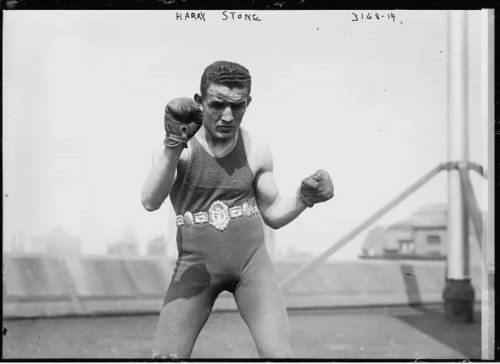 Born Harry Seifstein (March 4, 1893- December 13, 1950), in New York, lived a colorful life in and out of the squared circle. He had an extensive boxing career spanning multi-weight divisions from the featherweight, lightweight, welterweight, middleweight to the heavyweight ranks. He took Llew Edwards’ Australian lightweight title in 1920 only to lose it to Sid Godfrey the next year. He twice lost to hall-of-fame welterweight world champion Jack Britton. 'Hop' Harry, known for his stiff left jab and nimble, kangaroo-like footwork, reportedly fought 500 times without ever being knocked out (KO) or experiencing a technical knockout (TKO). Benjamin “Benny” Valgar, accomplished Jewish boxer, also achieved this feat, completing 250 fights unscathed. He was inducted into the Australian National Boxing Hall of Fame in 2013. Enclosed below is a long-lost story authored by Harry Stone in 1938, detailing his remarkable encounters with the gamest Filipino fighters he ever faced. 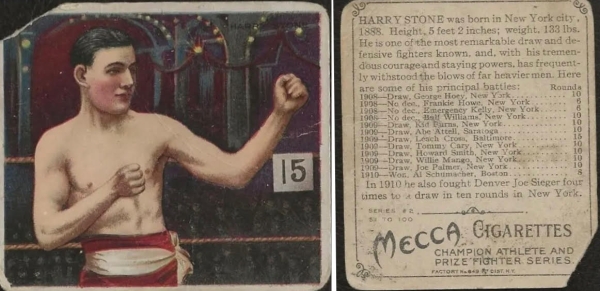 “Filipino Fighters Were Tough” Mail (Adelaide, SA: 1912 - 1954), Saturday 7 May 1938, page 12 By Harry Stone A tough little race of scrappers are the Filipinos. I know it, because I went among them and sampled their punches and enthusiasm for the oldest of recognised sports. Possibly I went there too late, from the point of view of having some easy bouts. And perhaps to have left my trip until I was 38 with 23 years of fighting behind me was another reason that I did not find things exactly 'armchair' at Manila. P.I., I liked the place, and liked the people I met but had I known the form of the local lads, I would have insisted on meeting some less aggressive lad than Ceferino Garcia in my first fight. The name Garcia meant nothing to me when Promoter Eddie Tait named him as my first opponent. Expected Something Easy It wouldn't have worried me if he told me that he wanted me to open up with Gene Tunney or Jack Dempsey. I usually figured out that a promoter gave a newcomer something easy for his initial bow, but I was only in the ring for a minute with Garcia when I realized that I was up against a strong, hard-hitting, aggressive youngster who knew nothing but to keep on fighting. I was the most surprised man in the stadium. Garcia was just 18 when he met me. It promised to be a battle of youth and vigor against experience and skill. Garcia certainly infused tons of vigor into his work, and I was busy trying to dodge his hefty swings. I went back to my corner after the first round and asked where they dug Garcia up from. The promoter answered me by asking if I thought the kid would make a fighter. 'Make a fighter?' I roared, 'why he’s one already.' Before I was halfway through my 12-rounder with Garcia, I had formed the opinion that he would go right to the top of the tree. The only thing I was sorry for was that he should make me one of the stepping stones. Although he was as green as grass, I was not able to trick him all the time. When I slowed down a bit he just slammed on the pace and pummeled me with both arms swinging. I tried hard to tie up his arms, but he had the strength to pull away and keep up his battery at my head and ribs. He was the best youngster I had fought. He was intelligent and in good hands. I knew that when he mastered some of the finer points of the game, he would be a handful for the lightweights far beyond his own country. He was, and it did not surprise me to read of him fighting Barney Ross, welter champion of the world, to a close decision recently. No Swollen Head One thing I liked about Ceferino Garcia was that he did not get a swollen head after getting the decision over me. As a fact, he came to my training quarters after the fight and asked me to show him a few moves that had him puzzled. In no time he had his shirt off and I had to demonstrate exactly what I meant. His enthusiasm was unlimited. Every time I showed him a move he turned to his trainer and cried, 'Harry Stone teach me another one, good fella.' The lad of 18 who thinks he knows everything has little chance of getting to the top; it is the keen lad who seeks information and knowledge from men with experience who does far in boxing. I found that the 'fight fans at Manila did not appreciate their own boys to their full worth. Because of my age, many discounted the performance of Garcia against me, but no one knew better than I did how to assess the value of the youngster's showing. My second fight in Manila was against Battling Nelson — a good, hard biting lightweight 'Stone makes fool of foe?' was the headline in one paper, while another said, 'Stone whips Nelson.' I had to rehabilitate myself after losing to Garcia, and I was after a match with Irineo Flores for the lightweight championship of the Orient. The only way to get that match was to beat Nelson decisively. I used all my tricks on him and set the tongues wagging. It resulted in my getting a crack at Flores. Like Garcia, he had tons of vigor and finishing well in the last four rounds he won the decision. The Manila 'Daily Bulletin' said, 'As the boys left the ring Flores bore marks of having been in a real fight, while Stone looked fresh and strong.' Other scribes gave the news out that I won easily, but I was past the stage when I worried about a referee's decision. Given a return bout with Flores we fought a draw. I was then in line for another bout with Garcia. As I was in better trim than when I met him on landing, I felt that I could hold him in check. After 10 rounds the referee and judges declared it a draw. In a nasty mood, the crowd were clamoring for the decision for Garcia, and while the referee was getting the votes of the judges it looked as though I would be mobbed. Two had voted in my favor, one against me, and the other declared a draw. Seeing that trouble was imminent, I told the referee to give a draw. He did so, and I made a hasty exit, while the crowd showered praise on the dusky little Garcia. I considered myself lucky to get out of the stadium that night with a whole skin. From the moment I landed at Manila I realized that the welter title would be easier to win than the lightweight. That may seem funny, but the crop of lightweights is generally in excess of welters. The holder of the welter title of the Orient was Luis Logan. He relied on a wallop to end contests. It was evident from the day I arrived that he didn't think of me as an easy target, and many verbal brickbats were thrown at me before I could get him signed up. To be candid, I didn't think he could hit me with a handful of shots. He couldn't, either, but he got the decision. Here is what the Manila 'Times' said about the contest: 'Harry Stone Beats Luis But Loses.' 'Looie Logan is still the welterweight champion, but it's not his fault. 'After engaging in a 12-round hugging contest at Eddie Tait’s Swatorium with Harry Stone, veteran American leather pusher, in which the latter did most of the hugging, and incidentally all of the hitting, Looie had his right mitt raised by the referee. 'As a fight it was a good wrestling match. Stone hugged, clinched, butted, talked, and in other ways outsmarted the welter champion in seven of the 12 rounds, while one was even. Even a draw decision would have been rotten. 'Tied Him in Knots' 'With the exception of the 7th, 11th, and 12th rounds. Stone tied Logan in knots. Logan was like a schooner in a rough sea without a rudder. His left hand, which made him famous, was conspicuous by its absence.' The referee lost popularity over that decision, while Logan's championship was regarded as a paper bag one by the men who competed in boxing in the Philippines. Although my experiences in Manila were mixed as far as referees were concerned, they did not worry me. I was passing through and the locals benefited more by winning a decision than I would have. It would not have been good for boxing if a veteran had cleaned up the young hopefuls. The young boxing country wants encouragement. While talking about Filipinos, it would be an oversight not to mention that fine little scrapper, Silvino Jamito who fought in Australia just after the war. I had a 20-round fight with Jamito at Sydney in 1922. He was puzzled at my kangaroo hops and tried to nail me with his round arm swings. Australians will remember Dencio Cabanela the rugged little fighter who died after his contest at Melbourne with the late Bert McCarthy. His body was sent to Manila to be buried close to the grave of Clever Sencio. World-famous little Pancho Villa also is at rest near his warrior pals. I did not want to leave Manila without seeing the last resting places of those three great scrappers, so was taken to the Cementerio del Norte by admirers of the lads who had done so much for the sport of boxing in the Philippines. Their deeds have inspired every nipper there and for years to -come we will see shades of Dencio. Villa, and Jamito. 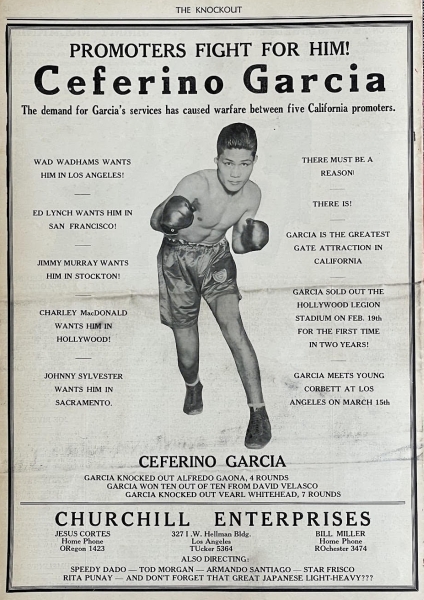 Will Keep Welters Busy In the meantime, my pal Ceferino Garcia will keep the welters of the world from resting on their laurels. Assuming that Garcia has increased in strength and improved in ringcraft in the 11 years that have sped by since I met him, I should say that he would be one of the most attractive fighters of his weight in the world today. What a fight it would have been between Carroll and Garcia! Leaving Manila. I made for San Francisco. I wanted to see my people and have another look over America, as I figured it might be the last chance I would get. Australia was the country I wanted to live in, but there* is always that feeling for kin and birthplace that calls to the roamer. Wherever I land I like to fight as that is the surest means I know of to get money. And I wasn't many hours in 'Frisco before I was linked up to fight a young fellow named Pete Daley. Daley had been toppling all the lads round the place, and he was a hot favorite for the bout. Finding my man easy, I gave the crowd a laugh by pulling some of my 'Hop Harry' stuff. It was new to them and even news to Daley. I had to get the Yankees talking about me, and I certainly picked a winner by strutting my silly stuff. At San Jose, I fought Young Carmen to a draw before a grand crowd. And before traveling east I was engaged to fight Hank Roberts, a middleweight, who was making a comeback. He was one of the most popular fighters in California, and definitely the greatest drawcard ever known in San Jose. When I won a decision over him his stocks slumped a bit but after my departure, he cleaned up a few of the locals to regain his lost prestige. At New Orleans I defeated Joe McCarthy, Young Denny, and Benny Vierra. Several fights were in the offing for me, and it was just a matter of staying in the States for a year to get good money, but once again I felt the lure of Australia. I guess it would make better citizens of some Australians if they went away to sample the climates and conditions of other lands. Perhaps I am one of the few of my persuasion who could not look after money. I made it and spent it before it burned holes in my pockets. Anyhow, it would cost a lot of money to travel as I did. For 30 years I traveled the world deluxe. So, even though I am broke today, I can say the experience I have gained has been worth the money I spent. 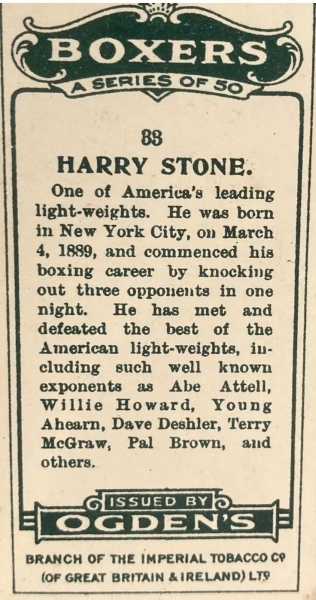 Notes: Harry Stone’s likeness and bio featured in this article are republished from Ogden and Mecca trading cards (public domain). Photo of Ceferino Garcia is from THE KNOCKOUT Vol. 5, MARCH 12, 1932 Issue, from the collection of the Philippine Boxing Historical Society. (Attached photos are for non-commercial use and in compliance with Fair Use Act) Click here to view a list of other articles written by Emmanuel Rivera, RRT. |
|
|
PhilBoxing.com has been created to support every aspiring Filipino boxer and the Philippine boxing scene in general. Please send comments to feedback@philboxing.com |
PRIVATE POLICY | LEGAL DISCLAIMER
developed and maintained by dong secuya © 2026 philboxing.com. |